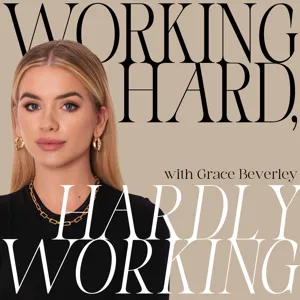Podcast Summary
Leveraging LinkedIn for Hiring and Saving Local Pubs: LinkedIn is crucial for businesses hiring professionals and preserving local pubs, as it holds a significant portion of job seekers and community members, respectively.
LinkedIn is a valuable resource for small businesses looking to hire professionals. It's like searching for your car keys in a fish tank to ignore LinkedIn when trying to find qualified candidates. Over 70% of LinkedIn users don't visit other leading job sites, making it the go-to platform for finding top talent, even those not actively seeking new opportunities. On a different note, the revival of country pubs is a trend driven by local residents who want to preserve their community's only amenity. These individuals often band together to buy and run the pub themselves, creating a sense of ownership and preserving the local culture. The investment in a country pub can potentially impact property prices positively, although the extent of this effect is uncertain. Overall, whether it's hiring professionals or saving a beloved local pub, these situations highlight the importance of taking action and making the most of available resources.
Taking Over a Local Pub: Challenges and Rewards: Despite challenges from competition and the need for investment, taking over a local pub can lead to decent returns. The Localism Act offers communities a chance to prevent bidding wars and keep pubs as community assets.
Taking over a local pub can be a challenging yet potentially rewarding venture. While some pubs may require more hands-on ownership, others may only need occasional involvement. Some pub owners get involved due to personal interest, while others are driven by the need to improve struggling businesses. The returns can be decent, but the competition can be tough, especially against pub companies. The Localism Act of 2011 allows communities to list pubs as assets of community value, giving them six months to put together a bid to prevent a bidding war with larger companies. Despite the challenges, many people have successfully taken over their local pubs and made a decent return. Additionally, Hometrack's research shows that house prices in 20 cities across the UK have varied, with some cities experiencing significant growth while others have remained stagnant.
London housing market vs rest of country: London house prices are falling while cities like Manchester and Birmingham continue to rise, with prices starting to soften in London commuter towns and strong growth in cities like Edinburgh and Manchester
There is a significant disparity between the London and Southeast housing market and the rest of the country. While London house price inflation is at its lowest in eight years, with prices falling in 40% of postcodes, house prices in cities like Manchester and Birmingham continue to rise at over 7% per annum. The figures are based on actual sales and valuations conducted by surveyors as part of the mortgage lending process. Prices are starting to soften in a range of areas in and around London, including commuter towns like Guildford and Gerrards Cross. This trend is expected to continue throughout 2018, with more price falls coming through in markets where pricing has gotten out of kilter with what buyers are willing or able to pay. In contrast, cities like Edinburgh and Manchester are seeing the strongest growth in the ranking.
Factors affecting Scottish housing market: Political and economic uncertainties slowed Scottish housing market growth, but cities like Liverpool, Manchester, and Birmingham see demand from owner occupiers, while Aberdeen faces falling prices due to oil price impact, and the wealthy opt for self-sufficient gardening
The Scottish housing market has experienced slower growth due to political and economic factors, such as the independence referendum and a new land and building tax. However, things are now improving, except in Aberdeen where prices are falling due to the oil price impact on the local economy. In contrast, cities like Liverpool, Manchester, and Birmingham are seeing significant demand from owner occupiers, who are feeling more confident and taking advantage of low mortgage rates and falling unemployment. Meanwhile, the trend for the wealthy is growing their own vegetables, not as a necessity but for the benefits of provenance, self-sufficiency, and community engagement. The discussion highlights the diverse factors influencing the housing market and the unique choices and behaviors of different demographics.
Enjoy unique tastes, flavors, and savings with home-grown produce: Growing your own fruits and vegetables offers unique flavors, savings, and the ability to enjoy fresh produce for longer periods through preservation techniques.
Growing your own fruits and vegetables at home can offer unique tastes, flavors, and savings, despite the occasional glut. With careful planning and preservation techniques like freezing and canning, you can enjoy fresh produce for longer periods and even share your creations with friends. Some produce, like certain types of beans and heirloom varieties, may be difficult or expensive to find in stores, making home-growing an attractive alternative. So, consider planting a diverse range of interesting and variable produce to enhance your culinary experiences.
Discovering new produce brings joy and appreciation: Exploring new produce can bring excitement, appreciation, and positive outcomes. In business, expressing gratitude boosts performance. In healthcare, additional coverage can manage unexpected costs.
Exploring new and unique produce can bring excitement and delight. James Max from FT Money shared his experiences with growing and tasting the asparagus pea, which is more of a bean, and the cucumber-like yet limey Cuckoo Melon. He expressed his eagerness to grow these new additions to his garden this year. Appreciation, whether for people or produce, can bring significant value. In the business world, platforms like Reward Gateway Edenred emphasize the importance of appreciation to boost performance and productivity. In the realm of healthcare, having additional coverage through plans like UnitedHealthcare's Health ProtectorGuard can help manage unexpected costs. Overall, embracing new experiences and expressing gratitude can lead to positive outcomes.






